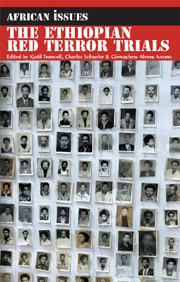Book contents
- Frontmatter
- Contents
- Notes on Contributors
- Preface
- Acknowledgements
- Abbreviations
- Glossary of Amharic Phrases
- 1 The ‘Red Terror’ Trials
- 2 The History of the Red Terror
- 3 The Rights of the Accused
- 4 The Role of the Special Prosecutor's Office
- 5 The Red Terror Trials versus Traditions of Restorative Justice in Ethiopia
- 6 A Quest for Justice or the Construction of Political Legitimacy?
- 7 Building State & Nation
- 8 Beyond the Red Terror Trials
- 9 Concluding the Main Red Terror Trial
- Index
1 - The ‘Red Terror’ Trials
The Context of Transitional Justice in Ethiopia
Published online by Cambridge University Press: 12 September 2012
- Frontmatter
- Contents
- Notes on Contributors
- Preface
- Acknowledgements
- Abbreviations
- Glossary of Amharic Phrases
- 1 The ‘Red Terror’ Trials
- 2 The History of the Red Terror
- 3 The Rights of the Accused
- 4 The Role of the Special Prosecutor's Office
- 5 The Red Terror Trials versus Traditions of Restorative Justice in Ethiopia
- 6 A Quest for Justice or the Construction of Political Legitimacy?
- 7 Building State & Nation
- 8 Beyond the Red Terror Trials
- 9 Concluding the Main Red Terror Trial
- Index
Summary
Introduction
Three decades after the appalling bloodshed and killings of tens of thousands of Ethiopians in a counter-revolutionary campaign called the ‘Red Terror’, the main officials who orchestrated the violence and gross human rights violations – Col. Mengistu Hailemariam and the key political leaders of his military junta – were found guilty of genocide and crimes against humanity on 12 December 2006, twelve years after the trial began. The Ethiopian Federal High Court sentenced Mengistu and his accomplices to life imprisonment. The verdict and sentencing were supposed to close one chapter in Ethiopia's horrendous and turbulent past. By evading capital punishment, however, the court's decision sparked angry reactions since others accused who were of lower political stature had previously been handed the death penalty. ‘Today's sentence makes a mockery of justice,’ exclaimed Ethiopians, and what was supposed to be the last chapter of the Red Terror trials seems sure to continue into a second phase, as both the prosecutor and the defence appeal to the supreme court. Moreover, after the verdict was read, increasing demand is being put on Zimbabwe to extradite former Derg leader Col. Mengistu Hailemariam from exile in order for him to serve his punishment in Ethiopia.
The issue of how to deal with human rights violations of former regimes – commonly termed as transitional justice – has developed into a broad field of study, involving scholars from different academic disciplines as well as advocates, human rights practitioners and government policy advisors.
- Type
- Chapter
- Information
- The Ethiopian Red Terror TrialsTransitional Justice Challenged, pp. 1 - 16Publisher: Boydell & BrewerPrint publication year: 2009



